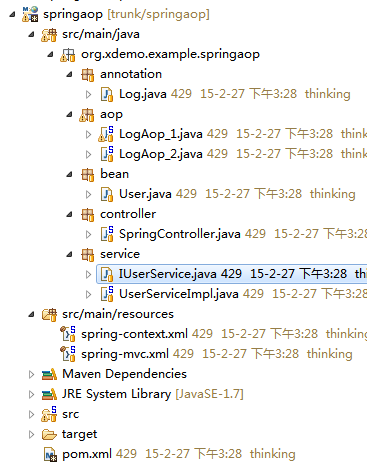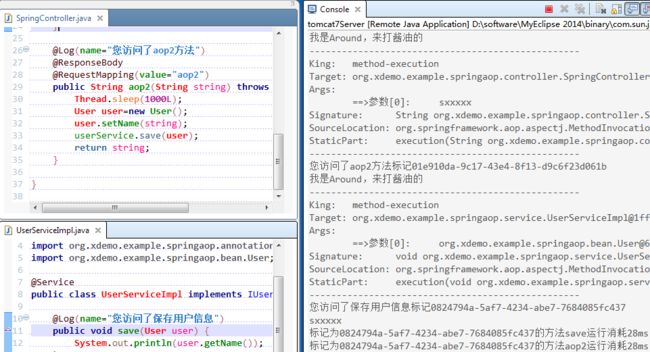2019独角兽企业重金招聘Python工程师标准>>> ![]()
转载请注明来源:http://www.xdemo.org/springmvc-aop-annotation/
其他参考:
http://www.importnew.com/13367.html
http://docs.spring.io/spring/docs/current/spring-framework-reference/html/aop.html
http://dove19900520.iteye.com/blog/2289806
http://jinnianshilongnian.iteye.com/blog/1670856
本文抛砖引玉,并没有详细的介绍更全面的内容,通过一个例子让初次使用的人能够快速入门,简单的介绍一下。
第一,注解:
-
@Before – 目标方法执行前执行
-
@After – 目标方法执行后执行
-
@AfterReturning – 目标方法返回后执行,如果发生异常不执行
-
@AfterThrowing – 异常时执行
-
@Around – 在执行上面其他操作的同时也执行这个方法
第二,SpringMVC如果要使用AOP注解,必须将
放在spring-servlet.xml(配置MVC的XML)中
第三,execution表达式请参考Spring官网http://docs.spring.io/spring/docs/current/spring-framework-reference/html/aop.html
代码下载:http://pan.baidu.com/s/1gdeopW3
项目截图
首先是Maven依赖
4.0.5.RELEASE
1.8.5
3.1.0
javax.servlet
javax.servlet-api
${servlet}
compile
org.springframework
spring-webmvc
${springframework}
org.springframework
spring-aop
${springframework}
org.aspectj
aspectjrt
${aspectj}
org.aspectj
aspectjweaver
${aspectj}
spring-context.xml配置,基本无内容
!-- 配置扫描路径 -->
spring-mvc.xml配置
Web.xml配置
Archetype Created Web Application
webAppRootKey
org.xdemo.example.springaop
contextConfigLocation
classpath:spring-context.xml
org.springframework.web.context.ContextLoaderListener
SpringMVC
org.springframework.web.servlet.DispatcherServlet
contextConfigLocation
classpath:spring-mvc.xml
1
SpringMVC
/
注解Log
package org.xdemo.example.springaop.annotation;
import java.lang.annotation.ElementType;
import java.lang.annotation.Retention;
import java.lang.annotation.RetentionPolicy;
import java.lang.annotation.Target;
@Retention(RetentionPolicy.RUNTIME)
@Target({ ElementType.METHOD })
public @interface Log {
String name() default "";
}日志AOP,写法一LogAop_1
package org.xdemo.example.springaop.aop;
import java.lang.reflect.Method;
import java.util.UUID;
import org.aspectj.lang.JoinPoint;
import org.aspectj.lang.ProceedingJoinPoint;
import org.aspectj.lang.annotation.After;
import org.aspectj.lang.annotation.Around;
import org.aspectj.lang.annotation.Aspect;
import org.aspectj.lang.annotation.Before;
import org.aspectj.lang.reflect.MethodSignature;
import org.springframework.stereotype.Component;
import org.xdemo.example.springaop.annotation.Log;
@Aspect
@Component
public class LogAop_1 {
ThreadLocal time=new ThreadLocal();
ThreadLocal tag=new ThreadLocal();
/**
* 在所有标注@Log的地方切入
* @param joinPoint
*/
@Before("@annotation(org.xdemo.example.springaop.annotation.Log)")
public void beforeExec(JoinPoint joinPoint){
time.set(System.currentTimeMillis());
tag.set(UUID.randomUUID().toString());
info(joinPoint);
MethodSignature ms=(MethodSignature) joinPoint.getSignature();
Method method=ms.getMethod();
System.out.println(method.getAnnotation(Log.class).name()+"标记"+tag.get());
}
@After("@annotation(org.xdemo.example.springaop.annotation.Log)")
public void afterExec(JoinPoint joinPoint){
MethodSignature ms=(MethodSignature) joinPoint.getSignature();
Method method=ms.getMethod();
System.out.println("标记为"+tag.get()+"的方法"+method.getName()+"运行消耗"+(System.currentTimeMillis()-time.get())+"ms");
}
@Around("@annotation(org.xdemo.example.springaop.annotation.Log)")
public void aroundExec(ProceedingJoinPoint pjp) throws Throwable{
System.out.println("我是Around,来打酱油的");
pjp.proceed();
}
private void info(JoinPoint joinPoint){
System.out.println("--------------------------------------------------");
System.out.println("King:\t"+joinPoint.getKind());
System.out.println("Target:\t"+joinPoint.getTarget().toString());
Object[] os=joinPoint.getArgs();
System.out.println("Args:");
for(int i=0;i参数["+i+"]:\t"+os[i].toString());
}
System.out.println("Signature:\t"+joinPoint.getSignature());
System.out.println("SourceLocation:\t"+joinPoint.getSourceLocation());
System.out.println("StaticPart:\t"+joinPoint.getStaticPart());
System.out.println("--------------------------------------------------");
}
} 日志AOP,写法二LogAop_2
package org.xdemo.example.springaop.aop;
import java.lang.reflect.Method;
import java.util.UUID;
import org.aspectj.lang.JoinPoint;
import org.aspectj.lang.ProceedingJoinPoint;
import org.aspectj.lang.annotation.After;
import org.aspectj.lang.annotation.Around;
import org.aspectj.lang.annotation.Aspect;
import org.aspectj.lang.annotation.Before;
import org.aspectj.lang.annotation.Pointcut;
import org.aspectj.lang.reflect.MethodSignature;
import org.springframework.stereotype.Component;
import org.xdemo.example.springaop.annotation.Log;
@Aspect
@Component
public class LogAop_2 {
ThreadLocal time=new ThreadLocal();
ThreadLocal tag=new ThreadLocal();
@Pointcut("@annotation(org.xdemo.example.springaop.annotation.Log)")
public void log(){
System.out.println("我是一个切入点");
}
/**
* 在所有标注@Log的地方切入
* @param joinPoint
*/
@Before("log()")
public void beforeExec(JoinPoint joinPoint){
time.set(System.currentTimeMillis());
tag.set(UUID.randomUUID().toString());
info(joinPoint);
MethodSignature ms=(MethodSignature) joinPoint.getSignature();
Method method=ms.getMethod();
System.out.println(method.getAnnotation(Log.class).name()+"标记"+tag.get());
}
@After("log()")
public void afterExec(JoinPoint joinPoint){
MethodSignature ms=(MethodSignature) joinPoint.getSignature();
Method method=ms.getMethod();
System.out.println("标记为"+tag.get()+"的方法"+method.getName()+"运行消耗"+(System.currentTimeMillis()-time.get())+"ms");
}
@Around("log()")
public void aroundExec(ProceedingJoinPoint pjp) throws Throwable{
System.out.println("我是Around,来打酱油的");
pjp.proceed();
}
private void info(JoinPoint joinPoint){
System.out.println("--------------------------------------------------");
System.out.println("King:\t"+joinPoint.getKind());
System.out.println("Target:\t"+joinPoint.getTarget().toString());
Object[] os=joinPoint.getArgs();
System.out.println("Args:");
for(int i=0;i参数["+i+"]:\t"+os[i].toString());
}
System.out.println("Signature:\t"+joinPoint.getSignature());
System.out.println("SourceLocation:\t"+joinPoint.getSourceLocation());
System.out.println("StaticPart:\t"+joinPoint.getStaticPart());
System.out.println("--------------------------------------------------");
}
} 用到的一个用户类User
package org.xdemo.example.springaop.bean;
public class User {
private String name;
public String getName() {
return name;
}
public void setName(String name) {
this.name = name;
}
}一个测试的Controller
package org.xdemo.example.springaop.controller;
import javax.annotation.Resource;
import org.springframework.stereotype.Controller;
import org.springframework.web.bind.annotation.RequestMapping;
import org.springframework.web.bind.annotation.ResponseBody;
import org.xdemo.example.springaop.annotation.Log;
import org.xdemo.example.springaop.bean.User;
import org.xdemo.example.springaop.service.IUserService;
@Controller
@RequestMapping("/aop")
public class SpringController {
@Resource IUserService userService;
@Log(name="您访问了aop1方法")
@ResponseBody
@RequestMapping(value="aop1")
public String aop1(){
return "AOP";
}
@Log(name="您访问了aop2方法")
@ResponseBody
@RequestMapping(value="aop2")
public String aop2(String string) throws InterruptedException{
Thread.sleep(1000L);
User user=new User();
user.setName(string);
userService.save(user);
return string;
}
}一个测试的接口实现类(接口类略)
package org.xdemo.example.springaop.service;
import org.springframework.stereotype.Service;
import org.xdemo.example.springaop.annotation.Log;
import org.xdemo.example.springaop.bean.User;
@Service
public class UserServiceImpl implements IUserService {
@Log(name = "您访问了保存用户信息")
public void save(User user) {
System.out.println(user.getName());
}
}在地址栏输入地址测试
http://localhost:8080/springaop/aop/aop2?string=sxxxxx
结果如下
转载请注明来源:http://www.xdemo.org/springmvc-aop-annotation/

